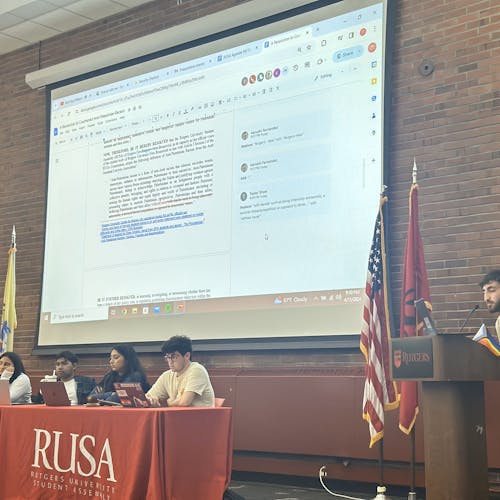Group provides training to help students assist suicidal persons

Counseling, Alcohol and Other Drug Assistance Program and Psychiatric Services (CAPS) has teamed up with the Rutgers Panhellenic Council, the governing body for 10 sororities on campus, to raise awareness about suicide among college students.
The program, called Campus Connect, provides students and staff on campus with a two-hour training session to initiate them as “gatekeepers.” The training informs them about mental health and suicide, including statistics and facts, said Annmarie Wacha-Montes, the assistant director for community-based services at CAPS.
Campus Connect is the first suicide prevention program created specifically for college campuses and uses an evidence-based approach that emphasizes the role the entire campus community can play in suicide prevention, said Amanda Foster, the vice president of recruitment for the Panhellenic Council.
The goal of this collaboration is to educate as many women in the University community as they can on the signs and symptoms of suicide, the School of Arts and Sciences senior said.
The training session, which is used at more than 150 universities and originated at Syracuse University, “uses experiential exercises and discussion about gatekeepers’ own fears” to prepare them for crisis scenarios such as anxiety-provoking situations of interacting with a suicidal student, Wacha-Montes said.
Interacting with a suicidal student allows gatekeepers to overcome the obstacles that often leave a student in crisis feeling misunderstood and invalidated, Wacha-Montes said.
“Through the connection, Campus Connect gatekeepers can understand the feelings of isolation of a suicidal student and allow the student to more fully benefit from referral and connection to professional resources such as CAPS," she said.
Emphasis is also placed on developing empathetic listening skills, communication skills and compassion for students regarding their suicidal ideation, she said.
Campus Connect gatekeepers gain an increased awareness of their own emotional reactions and are able to more effectively respond to students’ emotional needs and increase the likelihood of a meaningful connection with appropriate professional such as a therapist or psychiatrist, Wacha-Montes said.
She said training will also enable gatekeepers to respond effectively to students experiencing a wide range of emotional crises, not exclusively suicide ideation.
The turnout for training has been a success, Foster said. Their initial goal was to train 20 percent of their community, which is about 1,200 students and faculty.
“With so much excitement from the program we trained 25 percent (so far,)” Foster said. “Our hope moving forward is that it is a requirement for all new members who join in the spring to participate in this training, as we already have hazing education and alcohol education programs in place for our new members.”
CAPS presented its idea of Campus Connect to the Panhellenic Council, and several students expressed interest in presenting statistics during Campus Connect to the larger Panhellenic community, establishing a personal connection between the audience and mental health, Wacha-Montes said.
“This was the first time students presented with professional staff from CAPS and HOPE (Health Outreach, Promotion and Education),” Wacha-Montes said. “The feedback we received was overwhelmingly positive and helped break down the fear of discussing issues related to mental health.”
Foster hopes “people’s comfort and confidence in their ability to have hard conversations with a friend, classmate, teammate or fellow fraternity/sorority member, will increase.”
This idea, Foster said, is the basic foundation in bystander intervention – recognizing that someone might be struggling and taking the initiative to intervene.
This project is part of a greater effort called the Community-Based Approaches to Suicide Prevention, which is a working group comprised of faculty and staff from CAPS, HOPE, Residential Life, cultural centers, Academic Affairs and other departments.
This group was created in 2009, Foster said, and one of its first tasks was to find an effective suicide prevention training program that could be implemented at the University.
“It takes a community to save a life,” Wacha-Montes said. “We hope students are able to notice warning signs and ask their peers if they are thinking about suicide and connect them to CAPS or to call emergency services.”
CAPS is located on 17 Senior St. on the College Avenue campus and its number is (848) 932-7884. If someone is undergoing a severe mental health crisis and needs immediate assistance, call 911 or Acute Psychiatric Services at (855) 515-5700. The national suicide hotline is 1-800-273-TALK (8255).
Bushra Hasan is a School of Arts and Sciences sophomore majoring in cell biology and neuroscience. She is a correspondent for The Daily Targum. Follow her on Twitter @bushrafhasan for more.



